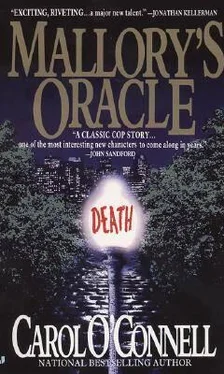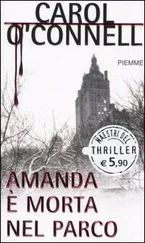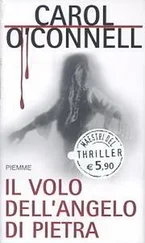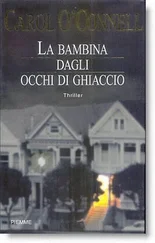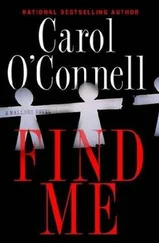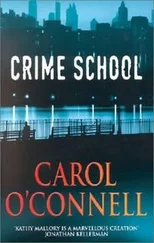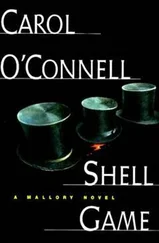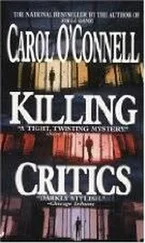"You two missed the best part," said Gaynor. "That card table rose straight up off the floor, maybe two feet in the air." His gesturing hand swept the sugar container off the table. "It scared the life out of me." He leaned down to retrieve the container. When he set it back on the table, the pepper-shaker was sent to Edith's lap. "Sorry. I wish I knew how she did it. The little boy was in plain sight a good three feet away, and Redwing's hands were flat on the table."
"That one's easy," said Mallory. "When she put her hands on the table, I saw the rings digging into her fingers. Then I saw the two ripples in the tablecloth where her rings had hooked the pins under the material. All she had to do was lift."
"Oh," he said and there was some disappointment in this syllable, as though he had only lately made the discovery of Peter Pan's wires. "But there was more. Tell me, were any of the murdered women stabbed in the breast?"
"Why do you ask?"
"When she contacted my dead aunt, the boy put his hand to the right breast. He cupped his hand, like this. No doubt there was a breast there, and then it was all bloody, stabbed or slashed open."
Mallory lifted her shoulders to say "Who knows" and then looked around for their waitress in time to see the white flash of the uniform disappearing through the ladies-room door which banged against the frame to say, fat chance she's coming out again any time soon.
On the sidewalk outside the cafe, Edith and Mallory parted company with Gaynor. After Mallory had driven Edith Candle home and seen her to the door of 3B, she stopped the elevator at the second floor. She had two hours to kill before her last appointment of the evening.
The door was unlocked. Was Charles picking up bad habits from Edith? In the reaction time of a good New Yorker, her gun cleared the holster with speed enough to fool the eye into thinking it had simply appeared in her right hand. Gun raised, she pushed open the door. All the light came from one of the back rooms. Silently, she made her way down the hall to the back office. A cat would have made more noise with its footfalls.
Charles was sitting in a warm pool of light which spread outward from the stained-glass lamp on his desk. He was completely absorbed in the journal on his blotter, with no idea that she was in the office or in the world. She envied him his perfect concentration. It was only a little unsettling to watch him reading at the speed of light.
Her gun returned to the shoulder holster as she stole back to the front room, not wanting to disturb him. There was just a little comfort in knowing he was there. Markowitz had said, go to Charles if she needed help, not if she wanted to use him and his connections. The old man would never have wanted her to drag him into this. She sat down on the couch. It was not the typically uncomfortable antique, but well padded and more like the furniture in the Brooklyn house. It was friendly in its response to her, plumping up around the slender outline of her body. She would have liked to stop here, to not move again. This night would not be over for a long time yet, and she was already flagging, eyes closing.
However she turned the thing over, she could not see what Markowitz had seen. Logic told her Coffey was right, and Markowitz had been caught out without a clue in hell as to who the perp was. But she continued to believe in Markowitz in the same way he had taught her to believe in the Shadow. Never mind logic. It only worked half the time, anyway. Her eyes closed.
She snapped awake when the couch rearranged its stuffing to accommodate another sitter. Charles was smiling at her. He had such a wonderfully loony smile. But now, his face was slowly changing to worry lines. What was he reading in her own face, she wondered? What had she given away to tell him something was wrong? Was there really any point in holding out on him? Could she? No, probably not.
"I gather the seance wasn't much of a success."
So, Edith had told him they were going to Gramercy.
And what else did he know? He could extrapolate volumes from near nothing.
"No, it wasn't. But I did have a nice chat with Markowitz."
Oh, she could see he didn't like that, not at all. There was more than worry in his eyes, but she could not account for it. Was he angry with her? Why?
"How did the medium know about you and Markowitz?" he asked.
His voice was very gentle. So she was not the one who angered him. Who then? Edith?
"I told her."
"That may have been a bad mistake. Did you tell Edith you were going to use Louis?"
"Yeah. I didn't have any choice. Gaynor thought it was a mistake, too." If Charles was her barometer, then Markowitz the dancing fool must be rocking and rolling in his grave. She was getting too messy, too noisy, telegraphing every damn move.
"Tell me what happened."
His hand was covering hers with the human warmth that Markowitz's last letter had promised. It had been so long since she'd been touched this way, she nearly didn't recognize the sensation. Go to him if you need help, said the Markowitz who lived inside her head with Helen, abiding in a detailed replica of the house in Brooklyn in the days when it gleamed with polish, and smelled of canned pine-trees.
She described the seance in every detail, the compulsive detail of habit. She only left out the part where she had been suckered into believing that it was Markowitz, simply because Redwing had looked and talked and acted like him, because Mallory had been one beat away from taking the chance to settle old business and say goodbye, and she had blown it. And hadn't that been the worst of it? Her eyes were open now. She had lost all the threads to make-believing and never would she get them back. She had seen the wires behind the works.
"Charles, how could she do him so well? She knew about the wounds. Nothing that specific was in the papers."
"That computer of yours has you blind-sided. With more field experience, you might have realized that quite a bit of data can be had through human networks. How many police officers were at the crime site, how many civilians, how many have wives, brother-in-laws, sisters, mothers, and who do those people talk to? If it all hangs on Markowitz's wounds, you have nothing. As to the impersonation, we've all seen Markowitz on television. He was on for days during the senate hearings. He signed two autographs one night when we were having dinner in Chinatown."
"And the boy imitating the slashed breast?"
"The boy was imitating a woman. He made a breast. Gaynor could hardly have seen it slashed. But that's not his fault. The more people you gather into one room, the more energy there is, and mass psychosis is more possible. You can be convinced you saw all sorts of things that never happened."
"All those old women knew about the link to the seance, and not one of them thought to call the cops. How do you figure that?"
"Well, as the woman said, it's miles more exciting than waiting to die in your sleep. You don't take anything at face value, do you?"
No, she did not. "Maybe something else frightened them more than the killer did."
"Fear of the police, for instance? You think these women are a gang of geriatric criminals?"
Well, Charles had one geriatric criminal in the family, didn't he? Edith did say you could get away with a lot when you were old. But that subject was forbidden.
"Maybe Redwing has some hold on them. She's good, Charles. You should have been there. And the Markowitz imitation was just too damn good. It took Markowitz an hour to die. Maybe Redwing had time to get to know him then."
"An incomplete portrait would have sufficed. Your memories of Louis rilled in whatever she missed. You did most of the work for her. Mediums depend on that. I've watched the best of them work. They put out half a general sentence, and the client fills in the blanks. Then the medium builds on the volunteered data. It's an art form. They're also guided by subtle nuances of facial expressions. Don't underestimate the power of an observant empathic to rip your mind inside out."
Читать дальше
